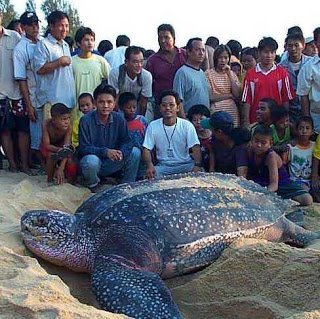 Marriott’s Phuket Beach Club and the JW Marriott Phuket Resort and Spa are located in exotic Thailand. The two Marriott resorts are adjacent to each other on Mai Khao Beach, the longest beach in Phuket with over 10 miles of undeveloped beachfront. Mai Khao is also the home of coastal wetlands, the Nai Yang National Marine Park, and a sea turtle nesting area.
Marriott’s Phuket Beach Club and the JW Marriott Phuket Resort and Spa are located in exotic Thailand. The two Marriott resorts are adjacent to each other on Mai Khao Beach, the longest beach in Phuket with over 10 miles of undeveloped beachfront. Mai Khao is also the home of coastal wetlands, the Nai Yang National Marine Park, and a sea turtle nesting area.
In conjunction with the grand opening of the JW Marriott Phuket Resort and Spa in 2002, Marriott donated $45,000 to launch the Mai Khao Marine Turtle Foundation. The Foundation’s mission is to raise funds and increase awareness for the plight of the critically endangered giant leatherback turtles that nest in the area.
Their numbers have been severely depleted over the last twenty years and the local Mai Khao villagers work hard to protect these magnificent animals. During the breeding season from November to February, sea turtles, particularly the giant leatherback, return to the beach where they were born to lay their eggs.
Local villagers patrol the beach at night during the breeding season, protecting the turtles while nesting, and keeping records of the number of eggs laid. When necessary the eggs are taken to a hatchery where the baby turtles are protected from elements of nature and human exploitation, and are then released in a special ceremony during the Songkran Festival (Thai New Year) in April.
Marriott works closely with the local authorities to support their efforts in sea turtle conservation. Prior to and during the construction phase of the resorts, the developers exceeded every requirement of the very stringent Environmental Impact Study for the property, ensuring environmental responsibility, safety and conservation. Educational programs on the Mai Khao Marine Turtle Foundation are held at the JW Marriott Phuket Resort and Spa for associates, guests and visitors.
The Mai Khao Marine Turtle Foundation committee has recently agreed to assist the Phuket Marine Biological Center (PMBC) in constructing a new rehabilitation pond for injured turtles. This project is also being supported by Marriott.
The PMBC reports that an average of 30 sea turtles are stranded on the beach each year. Although approximately 58% are alive, they are also injured, usually by their flippers being caught in fishing nets. Most of these injured turtles cannot be released back into the wild; therefore, the new rehabilitation pond must be engineered to provide long-term care.
(Photo credit – maikhaoturtles.com)